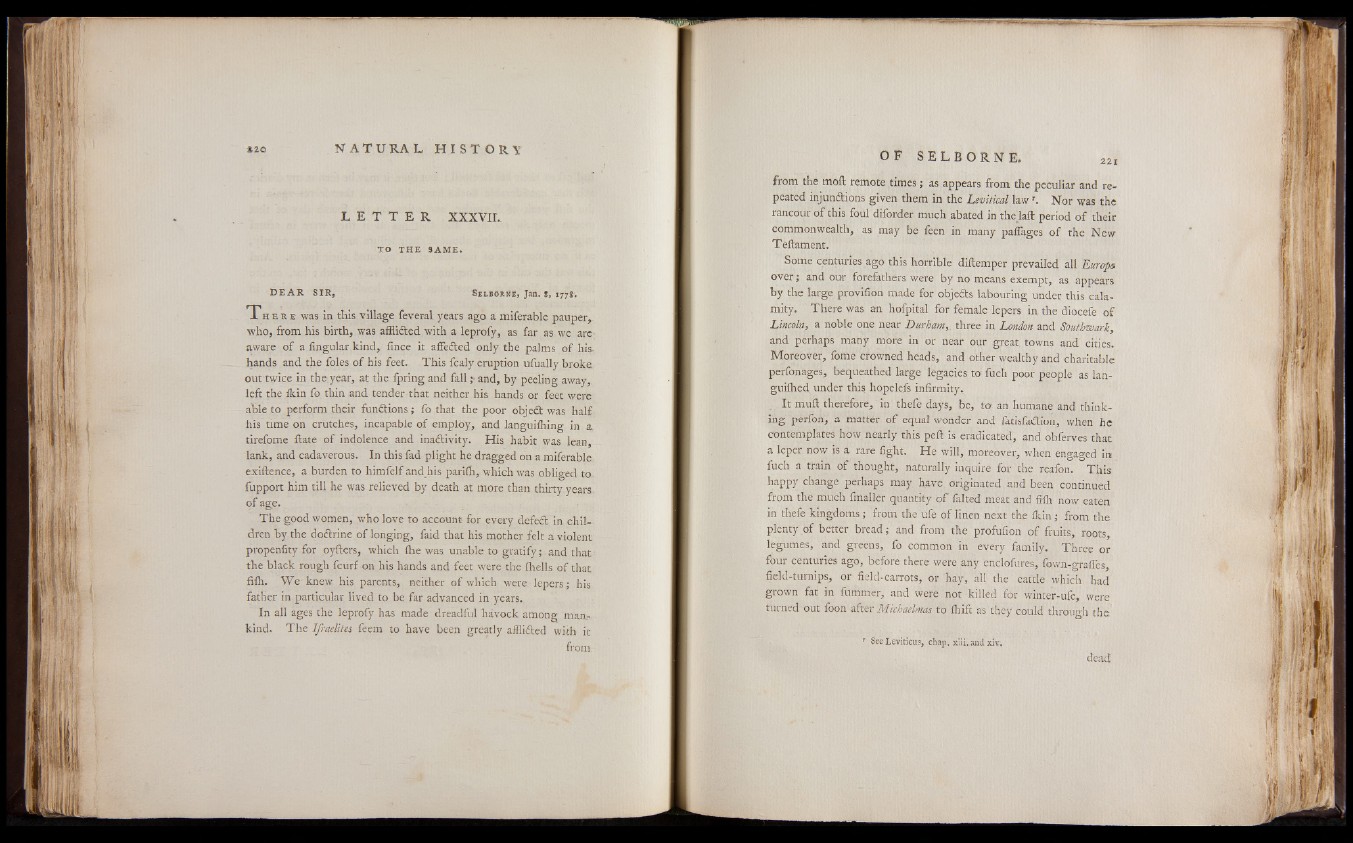
L E T T E R XXXVII.
TO THE SAME.
D E A R S IR , Selborhe, Jan. s, 177S.
T h e r e was in this village feveral years aga a miferable pauper,
who, from his birth, was afflicted with a leprofy, as far as we are
aware of a Angular kind, fince it affedted only the palms of his.
hands and the foies of his feet. This fca-ly eruption ufually broke
outtwice in the year, at the fpring and fall ,*• and, by peeling away,
left the fkin fo thin and tender that neither his hands or feet were
able to perform their fundtions; fo that the poor objedt was half
his time on crutches, incapable of employ, and Ianguifhing in a.
tirefome date of indolence and inadtivity. His habit was lean,
lank, and cadaverous. In this fad plight he dragged on a miferable.
exiftence, a burden to himfelf and his parifh, which was obliged to.
fupport him till he was relieved by death at more than thirty years,
of age.
The good women, who love to account for every defect in children
by the dodtrine of longing, faid that his mother felt a violent
propenfity for oyfters, which (he was unable to gratify;, and that
the black rough fcurf on his hands and feet were the fhells of that
filh, We-knew his parents, neither of which were lepers ; his
father in particular lived to be far advanced in years..
In all ages the leprofy has made dreadful havock among mankind.
The Ifraelites feem to have been greatly afflidted with it
from
from the mod remote times; as appears from the peculiar and repeated
injundtions given them in the Levitical lawr. Nor was the
rancour of this foul diforder much abated in thelaft period of their
commonwealth, as may be feen in many paflages of the New
Teftament.
Some centuries ago this horrible diftemper prevailed all Europe
over; and our forefathers were by no means exempt, as appears
by the large provifion made for objedts labouring under this calamity.
There was an hofpital for female lepers in the diocefe of
Lincoln, a noble one near Durham, three in London and Southwark,
and perhaps many more in or near our great towns and cities.
Moreover, fome crowned heads, and other wealthy and charitable
perfonages, bequeathed large legacies to fuch poor people as lan-
guifhed under this hopelefs infirmity,
. It muft therefore, in thefe days, be, to an humane and thinking
perfon, a matter o f equal wonder and fatisfadlion, when he
contemplates how nearly this peft is eradicated, and obferves that
a leper now is a rare light. He will, moreover, when engaged in
fuch a train of thought, naturally inquire for the reafon. This
happy change perhaps may have originated and been continued
from the much fmaller quantity o f falted meat and filh now eaten
in thefe kingdoms; from the ufe of linen next the lkin; from the
plenty of better bread; and from the profufion o f fruits, roots,
legumes, and greens, fo common in every family. Three or
four centuries ago, before there were any enclofures, fowmgralfes
field-turnips, or field-carrots, or hay, all the cattle which had
grown fat in fummer, and were not killed for winter-ufe, were
turned out foon after Michaelmas to Ihift as they could through the
r See Leviticus,, chap. xiii. and xiv.
dead